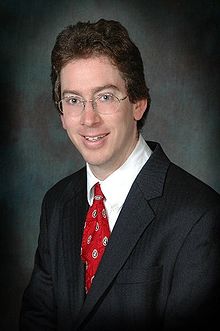Bryan Caplan
American economist and author (b. 1971)
Bryan Caplan (born April 8, 1971) is a libertarian George Mason University professor of economics.

| This economist article is a stub. You can help out with Wikiquote by expanding it! |
Quotes
edit- Wars fought exclusively on foreign soil do have marginally higher real output growth than peacetime periods, but real growth during all other wars is sharply below peacetime levels. Evidence for foreign and domestic wars is consistent with monetarist, fiscalist, and mixed theories of wartime booms.
- (April 2002)"How does war shock the economy?". Journal of International Money and Finance 21 (2): 145–162. DOI:10.1016/S0261-5606(01)00046-8.
- In a modern democracy, not only can a libertarian be elitist; a libertarian has to be elitist. To be a libertarian in a modern democracy is to say that nearly 300 million Americans are wrong, and a handful of nay-sayers are right.
- Quoted in Elitism or Populism: Pick Your Poison, by Arnold Kling (November 12, 2006)
- Through the lens of the Jock/Nerd Theory of History, the welfare state doesn’t look like a serious effort to "equalize outcomes." It looks more like a serious effort to block the "revenge of the nerds"—to keep them from using their financial success to unseat the jocks on every dimension of social status.
- Redistribution: Blocking the Revenge of the Nerds? (June 21, 2007)
- Mussolini wasn’t just another socialist; he was the Lenin of Italy – the leader of the hard-line revolutionary faction. And Mussolini wasn’t just a “newspaperman”; he was the editor of Avanti!, the official newspaper of the Socialist Party.
- For socialists, of course, Mussolini’s apostasy proves nothing except his supreme evil. For everyone else, though, Mussolini’s origin story puts his subsequent career in a whole new light. Outsiders can easily see what insiders deny: The apostate fruit rarely falls far from the orthodox tree.
- Yes, Mussolini realized that socialism plus nationalism had more mass appeal than socialism alone. Yes, Mussolini realized that socialism would be stronger if it allied with the Church instead of destroying it. Yes, Mussolini realized that full-fledged mass expropriation of private property would devastate the economy. And yes, Mussolini realized that the word “socialism” alienated millions of Italians who would otherwise be receptive to his message. But this doesn’t make Mussolini a radical socialist who betrayed everything he believed in. It makes him a radical socialist who dropped some peripheral socialist dogmas that stood between him and absolute power. If he’d kept the socialist label and avoided alliance with Hitler, Mussolini might now be a left-wing icon as big as Che Guevara.
- Bioethics is to ethics as astrology is to astronomy.
- Bioethics: Tuskegee vs. COVID (Feb 16, 2021)
The Case against Education (2018)
edit- Personally, then I have no reason to lash out at the education system. Quite the contrary. Yet a lifetime of experience, plus a quarter century of reading and reflection, convince me that our education system is big waste of time and money. Almost every politician vows to spend more on education. As an insider, I can't help gasping, "Why? You want to waste even more?"
- The Case against Education. p. 1.
- Magic isn't real. There has to be a logical reason explanation for the effect of Ivory Tower achievement on Real World success. And here it is: despite the chasm between what students learn and what workers do, academic success is a strong signal of worker productivity. The labor market doesn't pay you for the useless subjects you master; it pays for preexisting traits you reveal by mastering them.
- The Case against Education. p. 13.
- Statistical discrimination may be unfair and ugly, but it's hardly weird or implausible. Why is it any more weird or implausible to claim employers statistically discriminate on the basis of educational credentials?
- The Case against Education. p. 15.
External links
edit- Intellectual Autobiography of Bryan Caplan at econfaculty.gmu.edu